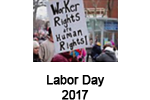An Attorney to Fight for You!
Affordable Rates
Disability Discrimination/Reasonable Accommodation
The Americans with Disabilities Act of 1990 (“ADA”) and the ADA Amendments Act of 2008 (sometimes referred to as the “ADA-AA”) were enacted to assure the inclusion of persons with disabilities in the labor market.
Federal (as well as state) laws protect employees from discrimination due to their disability provided they are “qualified individuals with a disability”, which is defined as an individual who, with or without reasonable accommodation, can perform the essential functions of the job in question, despite their disability.
Federal law further defines a “disability” as:
- a physical or mental impairment that substantially limits one or more of the major life activities of such individual;
- a record of such impairment; or
- being regarded as having such an impairment.
The ADA-AA has greatly expanded what is a ‘disability’ under the law. For example, according to the ADA-AA, performing manual tasks, such as lifting and working are major lift activities. 29 C.F.R. § 1630.2(i). To be substantially limited in the major life activity of working means that an individual is “significantly restricted in the ability to perform either a class of jobs or a broad range of jobs in various classes as compared to the average person having comparable training, skills and abilities.” 29 C.F.R. § 1630.2(j)(3)(I). A class of jobs includes “the number and types of jobs utilizing similar training, knowledge, skills or abilities, within [the employee’s] geographical area.” 29 C.F.R. § 1630.2(j)(3)(ii)(B) Powers v. USF Holland, Inc., 667 F.3d 815, 820 (7th Cir. 2011).
With regards to reasonable accommodation, the ADA explicitly states that the term “discriminate” includes “not making reasonable accommodations to the known physical and mental limitations of an otherwise qualified individual with a disability.
Affording an employee reasonable accommodation is required to be an interactive process rather than a situation where the employer merely dictates what is to occur.
As mentioned above, an individual is only “qualified” under the ADA if he or she is able, “with or without reasonable accommodation, to perform the essential functions of the employment position that such individual holds or desires.” 42 U.S.C. § 12111(8). Further probing this, the ADA defines a “reasonable accommodation” to include:
- making existing facilities used by employees readily accessible to and usable by individuals with disabilities; and
- job restructuring, part-time or modified work schedules, reassignment to a vacant position, acquisition or modification of equipment or devices, appropriate adjustment or modifications of examinations, training materials or policies, the provision of qualified readers or interpreters, and other similar accommodations for individuals with disabilities.
100% Healed Policy
Some Employers brazenly require an Employee to only be able to return to work if the Employee is 100% healed from an injury and does not require reasonable accommodation. Such a “100% healed policy” constitutes a per se violation of the ADA because it “prevents individual assessment . . . [and] necessarily operates to exclude disabled people that are qualified to work.” Steffen v. Donahoe, 680 F.3d 738, 748 (7th Cir. 2012) (citing Powers v. USF Holland, Inc., 667 F.3d 815, 819 (7th Cir. 2011) (“[A]ll courts agree that a 100% rule is impermissible as to a disabled person.”) (citation and internal quotation marks omitted).
Injury on-the-Job vs. not on-the-Job, and an Employee’s Right to Reasonable Accommodation of Being Placed in an Available Light Duty Position
In the situation where an Employee can only at that time return to work in a light duty position, Employers sometimes claim that they reserve available light duty positions just for employees who are injured on-the-job. And so, if an Employee is not injured on-the-job then (according to the Employer) the Employee has not right to such available light duty positions.
Yet, the law does not necessarily enable the Employer to legally take such a black and white position, and legality depend on a number of other factors, and the actual facts of the situations, including but not limited to the following:
- Are there available unfilled light duty positions;
- are the light duty positions temporary positions (e.g. just for 90 days) or not temporary (e.g. – the positions were given “with no end-date, no specified period for holding the job . . . [and] [the plaintiffs] remained in those jobs until a medical decision concerning the permanence of their disabilities was rendered.”);
- has the Employer really limited these claimed positions to Employees injured on-the-job
A case that provides a good analysis of the above two issues is Mazzacone v. Tyson Fresh Meats, Inc., 2016 U.S. Dist. LEXIS 25327, and the subsequent reconsideration of that same case affirming in part and revising in part at 195 F. Supp. 3d 1022 (2016).
Transfer to a Vacant Position (as a Reasonable Accommodation)
A disabled employee need not be the most qualified applicant for a vacant position, but he or she must be qualified for it. EEOC v. United Airlines, Inc., 693 F.3d 760, 764 (7th Cir. 2012) (holding that deviation from a best-qualified selection policy does not always represent an undue hardship for the employer); Jackson v. City of Chicago, 414 F.3d 806, 813 (7th Cir. 2005) (“The employer need only transfer the employee to a position for which the employee is otherwise qualified.”), quoting Rehling v. City of Chicago, 207 F.3d 1009, 1014 (7th Cir. 2000). The Act does not, however, require employers to promote employees to accommodate them. Malabarba v. Chicago Tribune Co., 149 F.3d 690, 699 (7th Cir. 1998), citing Shiring v. Runyon, 90 F.3d 827, 832 (3d Cir. 1996). See also Brown v. Milwaukee Bd. of Sch. Dirs., 855 F.3d 818 *, 2017 U.S. App. LEXIS 7958.
“Undue Hardship”
Employers sometimes attempt to claim that there would be an “undue hardship” to them for the Employer to need to provide the requested reasonable accommodation. But merely claiming undue hardship does not make it so. Undue hardship is specifically defined by the ADA at 42 U.S.C. § 12111(10) (defining “undue hardship” as “an action requiring significant difficulty or expense, when considered in light of the factors set forth in subparagraph (B)”). So this is a fact intensive analysis, and an Employer’s mere claim of “undue hardship” without more specificity is insufficient.
Retaliation
It is unlawful to retaliate against an individual for requesting reasonable accommodation or for complaining about disability discrimination.
Assorted issues that may be applicable to your situation:
- Were you an employee in good standing before you advised your employer that you had a disability, and then once your employer became aware of your disability your employer’s attitude towards you suddenly changed and your employer started going out of his/ her way looking for things that were allegedly wrong with your performance?
- Has your employer refused/ resisted/ unreasonably delayed affording you reasonable accommodation?
- Do you want to know how to most effectively (and most safely for your continued employment) go about requesting reasonable accommodation and/ or complaining about disability discrimination?
I have many years experience litigating ADA-AA claims in federal court, as well negotiating severance matters involving potential ADA-AA claims. I also have frequently advised current employees in ADA-AA matters, to inform them of their rights and to inform them of certain steps they should take to preemptively protect them from actions Employers may otherwise take against them in the future.
If you believe that you may have been subjected to discrimination/ harassment due to your disability, or if you are concerned that you may in the future be subjected to discrimination due to your disability, or if you need reasonable accommodation and are concerned that your employer will resist/ refuse your requests for same, then call me to briefly discuss if it makes sense for you to come in for an appointment to my Chicago loop office to further discuss your employment situation.



















